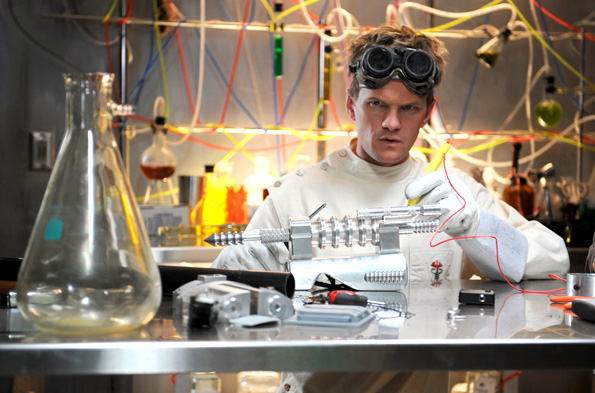I am a reverse professor. I do many of the career tasks an academic does, but I only get paid for the private sector component. And that's the part that a 'true academic' would do for free.
In practice, this means I have traded any form of job stability for complete academic freedom. I can research anything I wish, write about any topic from any stance, and speak freely. I have 'virtual tenure', only with no paycheck.
When I started this column in 2008, I was telling the story about how astronomy (and science) has changed from beign a field of discovery, to being yet another 9-5 grind. A UniverseToday OpEd by Jon Voisey discusess some of the external factors in this era where "the days of the lone astronomer at the eyepiece are already gone".
 |
| Is Dr. Horrible[tm] the future of science, or just a great role model? |
I prefer, however, this unintentionally humorous take on this subject. Taken from a Work-in-Progress (caps not mine) by non-scientist Goetz Hoeppe's titled "Astronomical Multiperspectivism":
Astronomy, it seems, has turned into a "cyberscience". Observational astronomers today spend considerably less of their professional lives observing at a telescope than, say, twenty years ago. Much of their work has shifted towards analyzing data obtained at diverse ground-based telescopes and satellites, often accessed via the Internet from databases or archives, including the Virtual Observatory, which store vast amounts of data, measured in Petabytes. The benefits for research appear to be enormous, as data from many facilities can be obtained similarly, are continually present, in principle available to the entire professional community, and can be combined in manifold ways. In my talk I shall consider the origins of this new data access regime and explore a mode of epistemic work enabled by it.I write on the same topic as 'the Daytime Astronomer' here at Science2.0, largely because I'm living it rather than seeing it from the sidelines. There's no 'consider the origins' of these changes in the culture of astronomy. The change is real and is noticed and discussed by its practioners (none who were interviewed for the above, I suspect).
Alas, I don't use works like 'epistemic' or put quotes around 'cyberscience'. So perhaps I'm not Guggenheim material. The author does need to avoid weasel words, though ('it seems', 'shifted towards', 'often', 'appear to be enormous', 'in principle', 'can be', 'shall consider'). There is no room for weasel words in science. Well, hardly ever.
Alex
Tuesdays at The Satellite Diaries and Friday at The Daytime Astronomer (twitter @skyday)





Comments